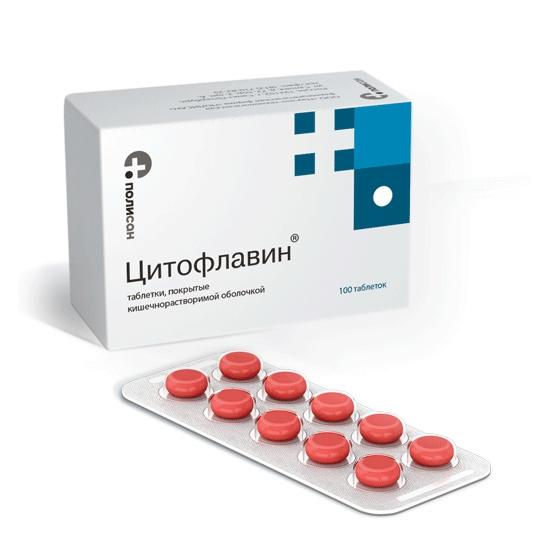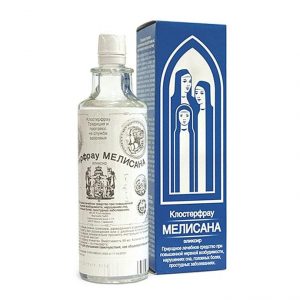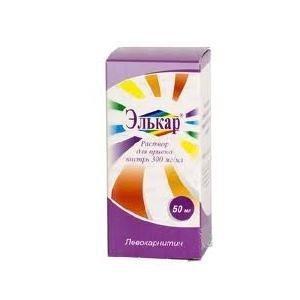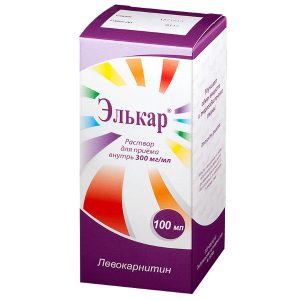Description
Packing
100 pcs.
Pharmacological action of
Pharmacodynamics of
Pharmacological effects are due to the complex effect of the components included in the preparation of CYTOFLAVIN ®.
CYTOFLAVIN ® promotes the activation of aerobic metabolism of cells, which leads to an increase in glucose utilization, contributes to an increased level of beta-oxidation of fatty acids and resynthesis of -aminobutyric acid in neurons.
CYTOFLAVIN ® increases the resistance of the membranes of nerve and glial cells to the effects of ischemia, which is reflected in a decrease in the concentration of neurospecific proteins, which characterize the level of destruction of the main structural components of the nervous tissue.
CYTOFLAVIN ® improves coronary and cerebral blood flow, activates metabolic processes in the central nervous system, restores impaired consciousness, promotes regression of neurological symptoms and improves cognitive functions of the brain. It has a quick awakening effect in post-anesthetic depression of consciousness.
When using the drug CITOFLAVIN ® in the first 12 hours from the onset of stroke, a favorable course of ischemic and necrotic processes in the affected area is observed (reduction of the focus), restoration of neurological status and reduced disability in the long term.
Pharmacokinetics
Cytoflavin is highly bioavailable.
Succinic acid when ingested penetrates from the gastrointestinal tract into the blood and tissues, participating in energy metabolism reactions, and completely decomposes to the final metabolic products (carbon dioxide and water) after 30 minutes.
Inosine is well absorbed from the gastrointestinal tract. The time to reach the maximum concentration in the blood is 5 hours, the average retention time in the blood is 5.5 hours, the equilibrium distribution volume is about 20 liters. Inosine is metabolized in the liver with the formation of inosine monophosphate, followed by its oxidation to uric acid. In a small amount excreted by the kidneys.
Nicotinamide is rapidly distributed in all tissues (equilibrium distribution volume of about 500 liters). The time to reach the maximum concentration in the blood is 2 hours, the average retention time in the blood is 4.5 hours. Nicotinamide crosses the placenta and is metabolized into breast milk in the liver with the formation of N-methylnicotinamide, excreted by the kidneys.
Riboflavin is rapidly absorbed from the gastrointestinal tract, is unevenly distributed (the largest amount in the myocardium, liver, and kidneys), is transformed into flavin adenine mononucleotide (FMN) and flavin adenine dinucleotide (FAD) in mitochondria. It crosses the placenta and is excreted into the breast milk by the kidneys, mainly in the form of metabolites.
Indications
In adults in complex therapy: 1. Acute cerebrovascular accident.
2. The consequences of cerebrovascular diseases (consequences of cerebral infarction, cerebral atherosclerosis).
3. Toxic and hypoxic encephalopathy in acute and chronic poisoning, endotoxemia, post-narcotic depression of consciousness, as well as for the prevention and treatment of hypoxic encephalopathy in cardiac surgery using cardiopulmonary bypass.
In children (including premature babies with a gestational age of 28-36 weeks) in complex therapy in the neonatal period:
1. With cerebral ischemia.
Contraindications
Hypersensitivity, to patients on mechanical ventilation, with a decrease in the partial pressure of oxygen in arterial blood of less than 60 mm RT. Art., period of breastfeeding.
Precautions – nephrolithiasis, gout, hyperuricemia.
Special instructions
For hypertension, dose adjustment of antihypertensive drugs may be required.
In patients with diabetes mellitus, treatment is carried out under the control of blood glucose concentration.
Perhaps intense staining of urine in yellow.
CYTOFLAVIN has no effect on: the ability to drive vehicles, work with moving mechanisms, work of dispatchers and operators.
Composition
1 tablet contains: active substances: succinic acid – 0.3 g riboxin (inosine) – 0.05 g nicotinamide – 0.025 g
riboflavin mononucleotide (riboflavin) – 0.005 g
excipients: polyvinylpyrrolidone average calcium stearate, a copolymer of methacrylic acid and ethyl acrylate, 1,2-propylene glycol, acid red 2C, Tropeolin O.
Dosage and administration
Inside, take 2 tablets 2 times a day with an interval between doses of 8-10 hours. Tablets should be taken at least 30 minutes before meals, without chewing, with water (100 ml).
Recommended use of the drug in the morning and afternoon (no later than 18 hours).
Duration of treatment 25 days. The appointment of a second course is possible with an interval of at least 1 month.
Side effects
Headache, pain or discomfort in the epigastric region. Allergic reactions in the form of skin hyperemia and itching are possible. Undesirable reactions include: transient hypoglycemia, hyperuricemia, exacerbation of concomitant gout.
If any of the side effects listed in the instructions get worse or you notice any other side effects, not specified in the instructions, inform your doctor.
Drug Interactions
Succinic acid, inosine and nicotinamide are compatible with other drugs. Riboflavin reduces the activity of certain antibiotics (tetracyclines, erythromycin, lincomycin), is incompatible with streptomycin. Ethanol, tricyclic antidepressants, tubular secretion blockers reduce the absorption of riboflavin, and thyroid hormones accelerate its metabolism.
Overdose of
To date, cases of an overdose of Cytoflavin have not been established.
Storage Conditions
In a dry, dark place at a temperature not exceeding 25 ° C. Keep away from children!
Expiration
2 years.
Active ingredient
Inosine, Nicotinamide, Riboflavin, Succinic acid
conditions granted through pharmacies
In retseptu
lekarstvennaja form
tablets
Polis NTFF LLC, Russia




